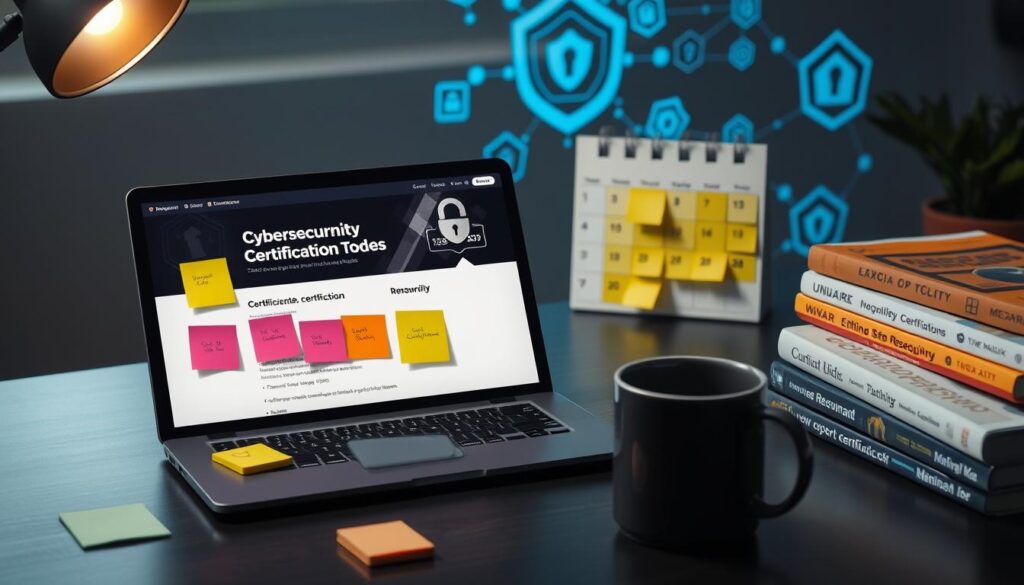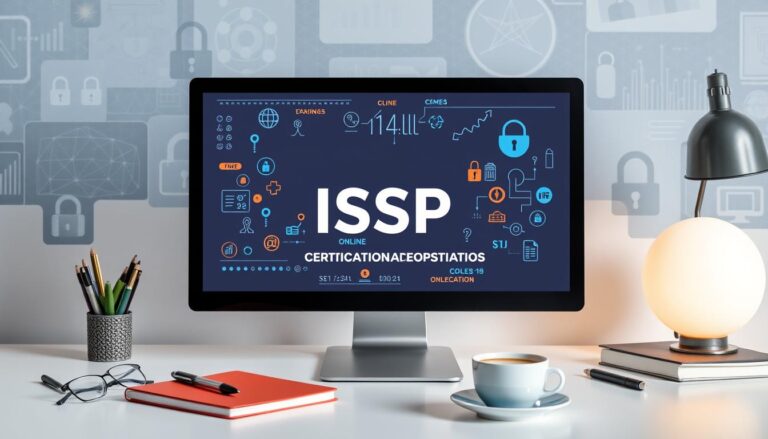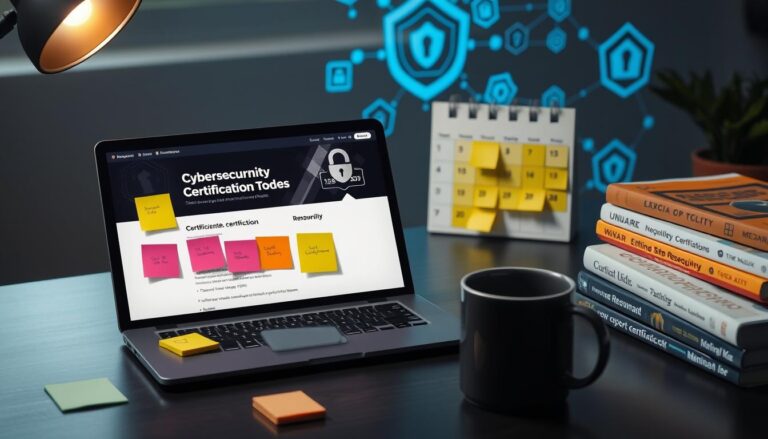
Did you know 94% of CISSP holders say keeping their certification boosts their career? This important certification in cybersecurity is only good for three years. Knowing how to renew it is key.
To renew your CISSP, you need to keep learning and earn CPE credits. This guide will show you how to keep your certification up to date. You’ll learn about the yearly fee and how to apply for renewal.
Understanding the Importance of CISSP Certification Renewal
Renewing your CISSP certification is key in the fast-changing world of cybersecurity. It shows you’re committed to keeping up with new trends and threats. Cybersecurity pros must always be ready to learn and adapt.
Letting your CISSP certification expire can harm your career. Employers might see it as a sign you’re not keeping up with your field. Keeping your certification current shows you’re serious about your job and boosts your chances in the job market.
To keep your CISSP, you need 120 Continuing Professional Education (CPE) credits over three years. You must get 90 Group A credits for advanced cybersecurity. The other 30 can be from Group B, covering broader topics. This isn’t just a rule; it’s how you stay sharp and useful in your job.
Doing CPE activities is essential to keep your CISSP. You can do things like going to webinars, reading industry news, or joining networking events. These activities help you learn and connect with others in your field.
In short, renewing your CISSP certification is more than just following rules. It shows you’re serious about learning and keeping up with the cybersecurity world. This boosts your professional standing and integrity in a field that’s always changing.
How Long is the CISSP Certification Valid?
The CISSP certification is good for three years after you get it. This shows how fast the field is changing. As a CISSP, you must keep up with new developments to avoid losing your certification.
To keep your certification, you need 120 Continuing Professional Education (CPE) credits in three years. That’s 20 credits each year. You can get these credits by taking courses or joining professional groups.
You also have to pay an annual fee to keep your certification. If you let it lapse for over six months, you’ll have to take the exam again. About 30% of CISSP holders don’t renew, so staying current is key.
CISSP Certification Renewal Requirements
To keep your CISSP certification, you need to meet several key requirements. You must get a total of 120 CPE credits over three years. You should have at least 30 CPE credits from Group B activities. The rest can come from Group A activities.
You can earn up to 90 CPE credits from Group A activities. This means you can get all your credits from learning alone.
CPE credits are based on the time you spend on activities. Usually, one hour equals 1 CPE credit. You can report credits in 0.25, 0.50, and 0.75 increments. For example, a 30-minute webinar can give you 0.5 CPE credits.
Another important part is the annual maintenance fee of $135. This fee is separate from your annual membership fee. Paying it every year shows your dedication to cybersecurity and follows the CISSP renewal requirements.
Every year, you must earn at least 40 CPE credits. This helps keep your skills up to date with the latest in cybersecurity.
| Activity Type | CPE Credits Earned | Notes |
|---|---|---|
| Education (Group A) | No cap on total CPE credits | At least three different entries required for maximum credits |
| Reading | 5 per book, 5 per magazine issue, 1 per white paper | Each requires a 250-word description |
| Industry Events | 6 for one-day, 12 for two-day | Cost approximately $1,000/day |
| Authoring | 1 credit per hour | Involves creating educational content |
Continuing Professional Education (CPE) Credits
Earning Continuing Professional Education (CPE) credits is key to keeping your CISSP certification. You need 120 CPE credits every three years to stay certified. It’s important to know the two types of CPEs to plan your learning well. Group A CPEs focus on deep cybersecurity topics, while Group B CPEs cover broader professional development areas.
Group A CPEs: In-Depth Cybersecurity Activities
Group A CPEs are for activities directly related to cybersecurity. You can get credits through:
- Attending educational seminars and courses, where you can earn up to one CPE credit per hour.
- Participation in conferences, allowing you to accumulate one credit for each hour or session.
- Engaging in ISC2 webinars that offer one CPE credit per session.
- Publishing articles or books in recognized outlets can also yield Group A CPE credits.
- Volunteering your expertise in cybersecurity-related events contributes to your CPE credits as well.
Group B CPEs: Broader Learning Experiences
Group B CPEs are for a wider range of activities that improve your skills but aren’t just about cybersecurity. Examples include:
- Leadership and project management courses aimed at making you more effective.
- Online self-paced training opportunities, which can yield up to 40 CPE credits.
- Attending ISC2 chapter meetings, allowing you to earn credits based on your participation.
- Committee work and volunteering in various educational settings can also contribute to your CPE credits.
Understanding the difference between Group A and Group B CPEs helps you plan your learning. This ensures you get the most CPE credits to meet your CISSP certification renewal needs.
| Activity Type | CPE Credit Type | CPE Credits Earned |
|---|---|---|
| Educational seminar | Group A | 1 credit per hour |
| Conference attendance | Group A | 1 credit per hour/session |
| ISC2 webinar | Group A | 1 credit per session |
| Online Boot Camp | Group A | up to 40 credits |
| Leadership course | Group B | Varies |
| Committee Work | Group B | CPE credits vary by activity |
How to Earn CPE Credits for CISSP Renewal
To keep your CISSP certification, you must earn CPE credits. You can do this through many activities. These not only meet the renewal needs but also boost your cybersecurity skills.
Educational Courses and Seminars
Learning through cybersecurity courses and seminars is key. Many groups offer programs that give you CPE credits when you finish. For example, a 60 CPE Course bundle has three courses, each with 20 CPE credits. This adds up to 60 credits after you complete them.
Whether it’s SANS training or classes from accredited places, these are important for your growth.
Publishing Articles and Research
Sharing your knowledge in cybersecurity can also earn you CPE credits. Writing articles, papers, or books on cybersecurity topics can give you up to 36 CPEs. This not only boosts your reputation but also makes you a leader in the field.
Volunteering in the Cybersecurity Community
Helping out in cybersecurity projects or events can also earn you CPE credits. By doing this, you show your dedication and can get up to 12 CPEs. It also highlights the value of teamwork and sharing knowledge in cybersecurity.
Calculating and Reporting Your CPE Credits
It’s key to know how to calculate and report CPE credits to keep your CISSP certification. You earn one CPE hour for every 50 minutes of learning. Use templates or spreadsheets to track your credits. Include details like dates, how long it lasted, and what kind of activity it was.
For instance, an 8-hour presentation with 90 minutes of breaks equals 7.75 CPE hours. This is found by dividing the 390 minutes of learning by 50. Always round to the nearest quarter hour when reporting CPE hours.
You must report at least 20 CPE hours each year. This adds up to 120 CPE hours over three years. Keeping detailed records is important because ISC2 might audit you. If you’re audited, you’ll need to show proof for all your reported activities.
Keep all your credit documents for at least 12 months after each reporting cycle ends. Not following these rules can lead to losing your certification. If your certification is taken away, you’ll have to pay a fee to get it back.
| Activity Duration | Active Participation | CPE Hours Earned |
|---|---|---|
| 8 hours | 6.5 hours | 7.75 |
| 5 hours | 4 hours | 4.5 |
| 3 hours | 2.5 hours | 2.75 |

Annual Maintenance Fee for CISSP Renewal
To keep your CISSP certification, you must pay an Annual Maintenance Fee (AMF) of $135 each year. This fee is part of the CISSP renewal costs. It helps support ISC2’s efforts to keep your certification strong.
The AMF helps keep certifications high quality. It also funds professional development, skills training, and career-long education. You can pay online with credit cards, PayPal, or vouchers. Or, you can use checks or wire transfers.
It’s worth noting that you only pay one AMF, no matter how many certifications you have. This fee is due on the anniversary of when you got certified. If you don’t pay on time, your certification might lapse.
Here’s a detailed look at the costs for getting and keeping your CISSP certification:
| Fee Type | Amount (USD) | Details |
|---|---|---|
| Annual Maintenance Fee (AMF) | $135 | For all ISC2 certified members including CISSP, SSCP, and others |
| AMF for Associates | $50 | Annual fee for ISC2 Associates |
| CISSP Exam Cost | $749 | Cost of taking the CISSP certification exam |
| CIO or CISO Average Salary (CISSP holders) | $127,000 | Average salary reflective of certification value |
| Certificates Lapses | Varies | Consequences of not paying AMF on time |
The money from AMFs goes back into ISC2’s programs. This includes exam administration, delivery, and security. By paying your AMF, you keep your certification and support cybersecurity excellence.
CISSP Certification Renewal Application Process
To renew your CISSP certification, follow a few key steps. First, collect all needed documents, like proof of Continuing Professional Education (CPE) credits. You must report 120 CPE credits over three years, with at least 40 each year.
Make sure you meet all application requirements to avoid delays. Your CPE activities should match the required categories. Keep records of your CPE credits, as ISC2 might check them. This includes proof from courses, seminars, and other activities.
Getting an endorsement from an active ISC2 member is also key. This shows your experience and commitment to ethics. Double-check your application before submitting to catch any mistakes.
If you need help, the ISC2 website has detailed application instructions. By following these steps, you can keep your CISSP certification active.

What Happens if You Don’t Renew Your CISSP Certification?
Not renewing your CISSP certification can have big consequences. You’ll lose your certification and the perks that come with it, like wearing the CISSP lapel pin. This makes it hard to show you’re certified, which can hurt your job chances.
Having a CISSP can boost your salary by 20% on average. It’s seen as key for info security jobs. Employers often look for current certifications when making hiring decisions.
Not renewing also has specific penalties. You need 120 Continuing Professional Education (CPE) credits over three years. If you don’t submit these within 90 days after it expires, your certification is suspended. This means you can’t use your certification, which can really limit your career.
Getting your certification back is possible but requires a lot. You must submit all CPE credits and pay for past fees. If your certification is terminated, you’ll need to get 120 CPE credits in 12 months and pass a reexamination.
| Action | Consequence |
|---|---|
| Fail to Renew | Loss of certification status |
| Miss CPE Credit Submission | Suspended status |
| Non-payment of AMF | Suspended status leading to possible revocation |
| Expired Certification | Questionable professional credibility |
| Reinstatement After Suspension | All outstanding CPE credits and past AMFs must be submitted |
| Termination of Certification | Requires 120 CPE credits and passing reexamination |
Understanding the CISSP Reactivation Policy
Keeping your CISSP certification up to date is key in today’s world. The CISSP reactivation policy helps those whose certifications have expired. If your CISSP renewal has lapsed, don’t worry; you can get it back.
To reactivate your CISSP certification, consider the following steps:
- File an Appeal: If you think your case deserves extra attention, you can appeal the non-renewal decision.
- Retake the Exam: Or, you can retake the CISSP exam to regain your certification. This might need more study, as the exam has changed.
Knowing the reactivation rules is important. You must follow the CISSP reactivation policy set by ISC2. This includes showing you’ve completed Continuing Professional Education (CPE) credits and paying any fees for the process.
| Pathway | Requirements | Notes |
|---|---|---|
| Appeal | Written explanation of circumstances | Must demonstrate how lapse occurred |
| Retake Exam | Registration for CISSP exam | Prepare thoroughly for updates to exam content |
Each path has its own challenges and chances. Knowing your options helps you move forward. Don’t wait too long; ignoring a lapsed CISSP certification can make it harder to get back on track.
Conclusion
Keeping your CISSP certification up to date is key in the fast-changing world of cybersecurity. It shows you’re serious about growing professionally and upholding ethical standards. By focusing on CISSP renewal, you boost your reputation and might even earn more, with CISSP holders making an average of $116,573 a year.
To get through the CISSP renewal process, aim to earn Continuing Professional Education (CPE) credits. Also, know about the annual maintenance fee (AMF) and keep learning. Each time you renew, you update your skills, helping you and your team.
By following CISSP renewal rules, you show your strong commitment to cybersecurity. It’s more than just keeping your certification; it’s about a lifelong journey of learning. This is vital for success in today’s complex cybersecurity world.
Source Links
- How to Renew Your CISSP Certification: Requirements and Process
- Renewal requirements for the CISSP [updated 2022]
- CISSP Exam Prerequisites: Experience & Renewal Requirements
- Maintaining Your CISSP Certification
- CISSP Certification: Elevating Cybersecurity Mastery
- Certified Information Systems Security Professional
- Frequently Asked CISSP, CISM, & CC Questions | ThorTeaches.com
- 2025 CISSP Renewal – 7 Paths to Renew CISSP Certification – San Francisco Business School
- CISSP Renewal: Steps to Maintain Your Certification
- CISSP – Certified Information Systems Security Professional | ISC2
- CPE Opportunities
- Managing Your ISC2 CPE Credits and Activities
- Earning CPE credits to maintain the CISSP
- CISSP CPE Hints | How to Earn ISC2 CPE Credits
- Ways to Earn CPEs to Renew Your Certs
- How to Report CPE | Continuing Professional Education | ISACA
- Maintain CISA Certification | CPE | ISACA
- AMFs Overview
- How much does it cost to get CISSP?
- Is CISSP Worth It? Certification Costs and Salary | BestColleges
- CISSP Exam Requirements & Prerequisites: Eligibility and Work Experience
- Risk of CISSP Certification Renewal
- Member Policies
- Renewing IT Certifications is a Scam
- CISSP Certification Renewal | How to Renew CISSP ? – Careerera
- Maintaining your CCSP Certification: Renewal Requirements
- Candidate Policies
- Everything You Need to Know About CISSP Certification: A Comprehensive Guide for Cybersecurity Professionals
- Is CISSP Certification Worth It? Expert Insights | CCS Learning Academy



